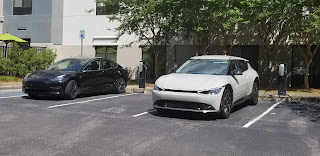Up until recently, Tesla, Toyota and General Motors customers were no longer eligible for upwards of $7,500 in tax credits toward the purchase of a new vehicle. Being that those automakers were early adopters of the electric vehicle movement and met the government requirement of selling 200,000 cars, this placed both their customers and the automakers at a disadvantage.
Moreover, new electric vehicles must be built in North America. A percentage of the electric battery must contain a specified contribution from the United States or its trade partners. This caveat related to the battery will go into effect in 2024.
Unfortunately, most of the electric vehicles, which qualified under the previous tax credit that expired on Monday, August 15, will no longer be eligible for the federal tax incentive under Biden's Inflation Reduction Act. Here's a list of 2022 and 2023 models which are currently eligible for the incentive as of Wednesday, August 17, according to the IRS.
New Electric Vehicle Incentive - Biden's Plan - Effective Jan. 2023
- $7,500 instant rebate
- MSRP up to $55,000 - Cars
- MSRP up to $80,000 - SUVs, Crossovers, Trucks & Vans
- Based on household income - Joint Filer: $300,000 max; Head of Household Filer: $225,000; and Single Filer: $150,000 max
- $4,000 instant rebate or 30 percent of the sale price, whichever is lower
- MSRP can't exceed $25,000
- It must be a model year 2 years earlier than the original date of sale
- Based on household income - Joint Filer:$150,000 max; Head of Household Filer: $112,500; and Single Filer: $75,000
In order for automakers to comply with these new rules, it's expected that a number of them will begin to make announcements as to how they will be shifting EV production to North America, as to remain competitive. Lastly, this will also entice automakers to adjust their car prices, making them more affordable in order for consumers to qualify for the instant rebate credit.







No comments:
Post a Comment